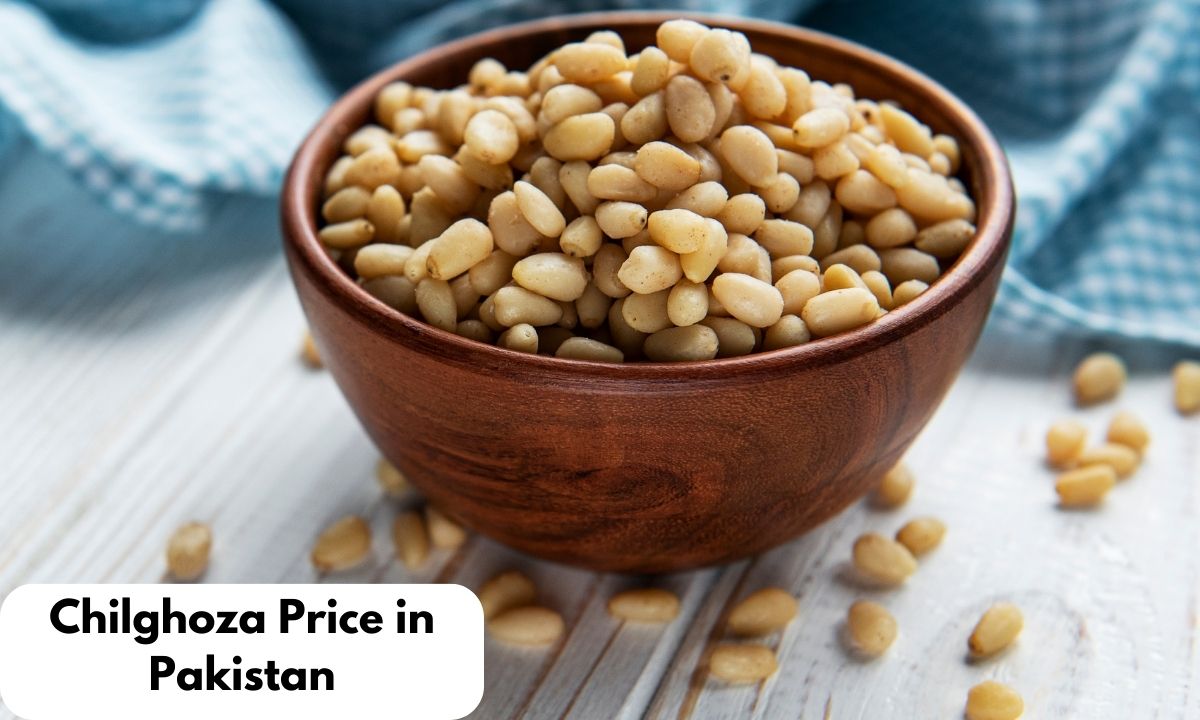Chilgoza Price in Pakistan (Latest Price Guide)
Chilgoza, commonly recognized as pine nuts, plays a significant role in both Pakistani dishes and overall well-being. These tiny, flavorful nuts are packed with vital nutrients. By the end of 2023, their cost in Pakistan varies between PKR 7,000 and PKR 20,000 per kilogram, influenced by their variety and whether they come with shells.
Lately, the cost has risen notably due to factors like seasonal demands, reduced harvests, and increased transportation expenses. Yet, despite their high price tag, Chilgoza remains a prized ingredient in Pakistani households because of its delightful taste and health advantages.
Current Chilgoza Prices in Pakistan
The current prices for different types of Chilgoza (pine nuts) in Pakistan show a considerable range. The cost per kilogram starts at PKR 7,000 and can go up to PKR 20,000. Here’s a breakdown of the price range for specific Chilgoza varieties:
- Afghani Chilgoza: Priced between PKR 6,000 – PKR 7,000.
- Chilgoza Without Shell: Ranging from PKR 18,500 – PKR 20,000.
- Gilgit Chilghoza: Varied prices between PKR 8,000 – PKR 10,000.
When comparing Chilgoza with and without shells, it becomes evident that Chilgoza without shells is the more expensive option, with prices ranging from PKR 18,500 – PKR 20,000 per kilogram. In contrast, Chilgoza with shells is priced between PKR 6,500 and PKR 8,500 per kilogram.
There are also notable price differences between local and imported (Afghan) Chilgoza. Afghani Chilgoza is priced around PKR 7,000 per kilogram, while Chilgoza cultivated in parts of Gilgit, Pakistan, is priced between PKR 8,000 and PKR 10,000 per kilogram. These variations in prices can be attributed to factors such as quality, transportation costs, and regional availability.
The Factors Influencing Chilgoza Prices
Chilgoza, commonly known as pine nuts, holds a prominent position in Pakistani culinary traditions, particularly during the winter months when demand surges. This seasonal uptick in demand often results in heightened prices.
The volume of Chilgoza produced is a pivotal factor in its pricing dynamics. Unfortunately, issues like unauthorized tree cutting, inadequate forest management, and the effects of climate change have curtailed Chilgoza production. This reduced output can create a supply gap, subsequently pushing up Chilgoza prices.
Moreover, the costs associated with transporting Chilgoza from its production hubs to marketplaces can amplify its final price. Additionally, the regional abundance or scarcity of Chilgoza impacts its pricing structure. In regions flush with Chilgoza, prices might be more competitive than in areas where it’s in short supply.
Recent market dynamics highlight fluctuating Chilgoza prices in Pakistan, influenced by diverse factors. Notably, the COVID-19 pandemic caused a notable dip in Chilgoza prices due to disruptions preventing traders from transporting it to both China and local markets. However, the renewed interest from Chinese investors in Chilgoza nuts has significantly reshaped the market, accounting for nearly 70 percent of local sales for non-timber forest products and thereby influencing pricing trends.
Where to Buy Chilgoza in Pakistan
In Pakistan, Chilgoza, referred to as pine nuts, is readily available for purchase through various online platforms and local markets. Among the online avenues, Hunza Bazar stands out, offering a diverse range of Chilgoza types, particularly those sourced from Gilgit Baltistan.
Similarly, MangoNation.pk specializes in selling Chilgoza with their shells intact. For those interested in bulk purchases, Alibaba.com lists multiple Chilgoza suppliers. Another notable platform is Leyjao.pk, where customers can explore a variety of Chilgoza options, including both Afghani and Gilgit varieties, with or without shells.
Delving into price considerations, online shopping occasionally presents more economical options, thanks to periodic discounts and promotional offers. Take, for example, Hunza Bazar, which not only provides Chilgoza at reduced rates but also offers the added convenience of home delivery, eliminating the need to navigate local markets.
Furthermore, online platforms frequently furnish comprehensive product details and customer feedback, empowering potential buyers to make well-informed choices. Nevertheless, it’s essential to note that prices can fluctuate based on factors like quality, variety, and whether the Chilgoza is shelled or not.
As a result, consumers might encounter prices spanning from PKR 4,500 to PKR 20,000 per kilogram. One cannot overlook the convenience aspect of online shopping, allowing individuals to place orders from their residences and receive deliveries right at their doorsteps.
Challenges and Future of Chilgoza in Pakistan
Chilgoza, commonly referred to as pine nuts, holds both culinary and economic significance in Pakistan. Regrettably, its production within the country has seen a decline due to multiple challenges, impacting its availability and cost.
Factors Leading to Reduced Chilgoza Production
Chilgoza trees demand patience, taking 3 to 4 years to reach a suitable planting stage. These trees face vulnerabilities, especially from insects and pests during cone development. Traditional harvesting methods, which sometimes necessitate cutting entire branches or trees, contribute to forest deterioration. Climate change, inadequate forest management, and illicit wood extraction further exacerbate the situation. Such unsustainable practices have diminished seed production and hindered natural regeneration.
Consequences on Availability and Pricing
This dwindling production directly affects Chilgoza’s availability, subsequently elevating its market price. Essentially, as its supply diminishes, demand-driven economics dictate a rise in its cost.
Strategies to Boost Chilgoza Production
To counteract these challenges, proactive measures are imperative. Pakistan’s Restoration Initiative (TRI) champions the cause by emphasizing the rejuvenation, safeguarding, and sustainable management of Chilgoza pine forests. The initiative empowers local communities through education on scientific forest management, sustainable harvesting practices, and enhanced post-harvest methodologies.
Furthermore, facilitating Chilgoza processing units and supplying specialized harvesting toolkits can motivate communities towards more sustainable Chilgoza ecosystem management. TRI Pakistan’s endeavors also extend to fostering local Chilgoza processing capacities, ensuring forest rejuvenation while safeguarding local livelihoods.
Additionally, championing the adoption of energy-efficient stoves and gasifiers can mitigate deforestation pressures on Chilgoza pine ecosystems. By diminishing wood demand for fuel, such interventions bolster the preservation and longevity of Chilgoza forests.
Conclusion
Chilgoza occupies a cherished spot in Pakistani culture and culinary traditions. Despite the varying prices that present challenges, the abundant health advantages associated with them make Chilgoza a prized dietary component. Consequently, it becomes essential to enhance awareness regarding these price fluctuations and the underlying determinants. Such knowledge empowers consumers, enabling them to make enlightened choices when purchasing Chilgoza.






